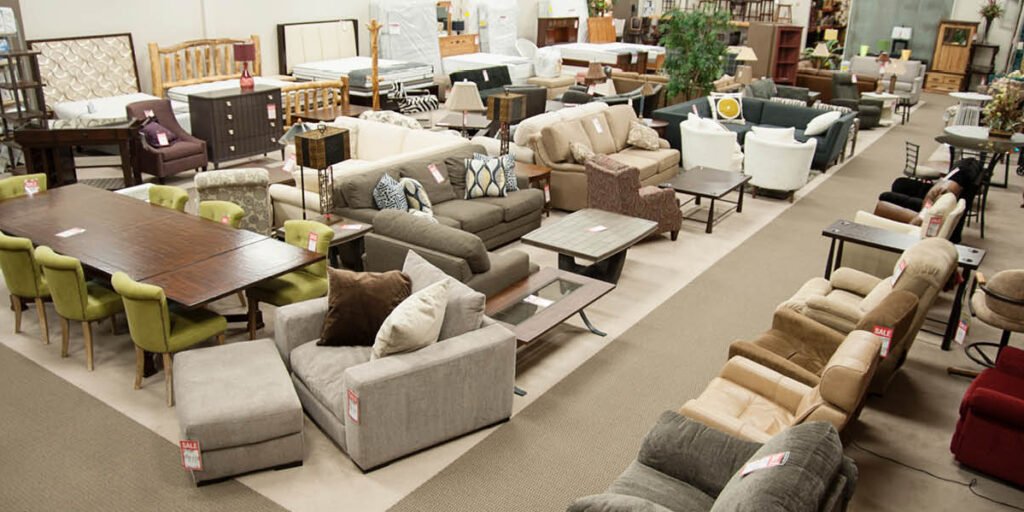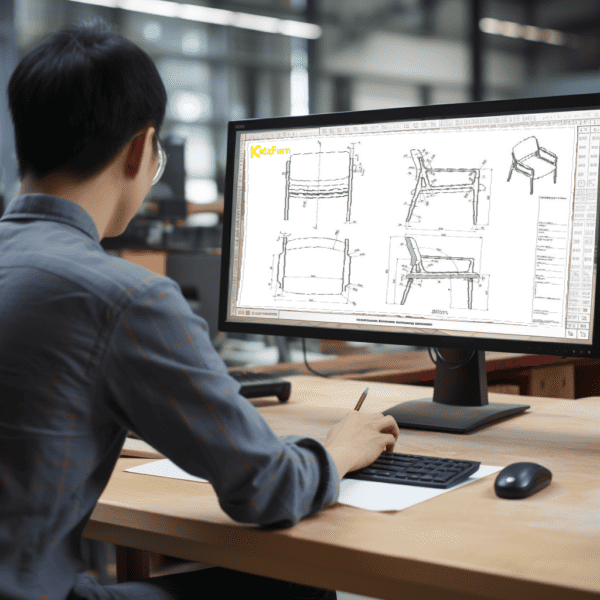How to Start a Furniture Business?
1. Why Start a Furniture Business?
The furniture industry presents a world of opportunities for entrepreneurs. With the growing market potential and demand for quality furniture, starting a furniture business can be a highly rewarding venture. This industry allows for significant creativity and customization, catering to diverse customer needs and preferences. Whether you’re interested in retail, wholesale, online sales, or custom manufacturing, there’s a niche for everyone.
How Profitable is the Furniture Business?
The furniture business, especially for small companies and husband-and-wife shops selling on Amazon, can be quite profitable. However, the range of profitability varies widely depending on several factors such as product type, sourcing costs, competition, and marketing strategies. Let’s break it down:
- Average Profit Margins:
- For most furniture businesses, profit margins range between 20% to 40%.
- Premium and custom-made furniture can sometimes reach profit margins of 50% or more.
- Factors Affecting Profitability:
- Sourcing Costs: Lower sourcing costs can significantly increase profit margins.
- Shipping Costs: Efficient logistics and shipping can reduce expenses, boosting overall profitability.
- Amazon Fees: Consider Amazon’s referral fees, fulfillment fees, and other associated costs.
- Marketing Expenses: Effective marketing strategies can drive sales but will also incur costs.

2. Market Research and Business Planning
Identify Your Niche
Finding your niche is the first step in establishing a successful furniture business. Consider the following types of furniture to determine where your interests and market demands align:
- Home Furniture: Living room sets, bedroom suites, dining tables, and storage solutions.
- Office Furniture: Desks, chairs, conference tables, and ergonomic solutions.
- Outdoor Furniture: Patio sets, garden furniture, and outdoor decor.
- Custom Pieces: Unique, bespoke furniture tailored to individual customer specifications.
Target Customers
Understanding your target customers is crucial. Analyze their demographics, preferences, and purchasing behavior:
- Demographics: Age, income level, occupation, and lifestyle.
- Preferences: Style preferences (modern, traditional, rustic), material choices (wood, metal, plastic), and functionality needs.
- Purchasing Behavior: Online vs. in-store shopping habits, price sensitivity, and frequency of furniture purchases.
Competitive Analysis
Conduct a thorough analysis of your competitors to understand the market landscape:
- Research Competitors: Identify key players in your chosen niche. Examine their product range, pricing strategies, and customer reviews.
- Strengths and Weaknesses: Assess what your competitors do well and where they fall short. Look for opportunities to differentiate your offerings.
- Market Position: Determine where your competitors stand in the market. Are they premium brands, mid-range, or budget-focused?
Market Trends and Gaps
Stay informed about current market trends and identify gaps that your business can fill. This might include sustainable furniture options, smart furniture integrated with technology, or multifunctional pieces catering to smaller living spaces.

Business Plan Development
Developing a comprehensive business plan is essential for guiding your business and attracting investors. Include the following elements:
- Mission and Vision Statements: Define your business’s purpose and long-term goals. Your mission statement should articulate what your business stands for, while the vision statement outlines your future aspirations.
- Business Model: Decide whether you’ll operate on a B2B (business-to-business), B2C (business-to-consumer), or hybrid model. Each approach has different implications for sales strategies, marketing, and customer service.
- Financial Projections and Budgeting: Prepare detailed financial projections, including startup costs, operating expenses, revenue forecasts, and break-even analysis. This will help you understand the financial viability of your business and plan for sustainable growth.
By following these detailed steps, you’ll be well-prepared to launch and grow a successful furniture business. Remember, thorough research and meticulous planning are the foundation of any successful enterprise.
3. Legal and Financial Setup
Choose a Business Structure
Selecting the right business structure is crucial for your furniture business, as it affects your legal obligations, tax liabilities, and personal risk. Here are the common types:
- Sole Proprietorship: This is the simplest structure where you, as the owner, are personally responsible for all business debts and obligations. It requires minimal paperwork but offers no personal liability protection.
- Partnership: This involves two or more people sharing ownership. Partnerships can be general (equal responsibility and liability) or limited (limited partners have restricted liability). Legal agreements are essential to outline each partner’s role and share of profits.
- LLC (Limited Liability Company): An LLC provides personal liability protection for its owners (members) while allowing profits to be taxed on the members’ personal tax returns. It combines the simplicity of a partnership with the liability protection of a corporation.
- Corporation: A corporation is a separate legal entity from its owners, providing the highest level of personal liability protection. It can be more complex and costly to establish, involving more regulations and tax requirements. Corporations can be C-corps (taxed separately from owners) or S-corps (profits and losses pass through to owners’ personal tax returns).

Register Your Business
Once you’ve chosen your business structure, you’ll need to register your business. Here are the steps:
- Business Name Registration: Choose a unique business name and register it with your state’s business department. Ensure the name is not already in use by searching the state’s business registry.
- Obtaining Necessary Licenses and Permits: Check with local, state, and federal authorities to determine what licenses and permits you need. This could include a general business license, sales tax permit, health and safety permits, and zoning permits. Ensure compliance to avoid legal issues.
Financial Planning
Effective financial planning ensures your business’s stability and growth. Here’s what to consider:
- Opening a Business Bank Account: Separate your personal and business finances by opening a dedicated business bank account. This helps in managing cash flow, simplifying tax filings, and building business credit.
- Setting Up Accounting and Bookkeeping Systems: Implement an accounting system to track income, expenses, assets, and liabilities. You can use software like QuickBooks or hire a professional accountant to maintain accurate records and prepare financial statements.
- Exploring Funding Options: Assess your startup costs and explore funding options such as:
- Loans: Consider small business loans from banks or credit unions, backed by collateral.
- Investors: Seek out angel investors or venture capitalists willing to invest in your business for a share of ownership.
- Grants: Research and apply for grants specifically available to small businesses, which do not require repayment.

4. How To Import Furniture From China?
Importing furniture from China can be a cost-effective way to source high-quality products, but it involves several steps to ensure smooth and successful transactions. Here’s a detailed guide:
Research and Identity Suppliers
- Online Marketplaces: Start by exploring online marketplaces like Alibaba, Global Sources, and Made-in-China. These platforms host thousands of suppliers, allowing you to compare products, prices, and reviews.
- Trade Shows: Attend trade shows such as the Canton Fair or the China International Furniture Expo. These events provide a great opportunity to meet suppliers in person, inspect products, and establish relationships.
- Factory Visits: Whenever possible, visit the factories to assess their production capabilities, quality control processes, and working conditions.

Read More: Is Alibaba Legit? An In-Depth Look at the Influential Online Platform
Verify Suppliers
- Background Check: Perform a background check on potential suppliers. Verify their business licenses, check for certifications, and request references from other clients.
- Samples: Order samples to evaluate the quality of the products. This step is crucial before placing a large order.
Negotiation and Agreement
- Pricing: Negotiate pricing, payment terms, and order quantities. Be clear about your budget and payment expectations.
- Contracts: Draft a detailed contract specifying product specifications, delivery timelines, payment terms, and quality standards. Include clauses for dispute resolution and penalties for delays or defects.
Shipping and Logistics
- Freight Forwarder: Hire a reliable freight forwarder to handle shipping logistics. They can assist with packaging, documentation, customs clearance, and transportation.
- Incoterms: Understand Incoterms (International Commercial Terms) to clarify the responsibilities of buyers and sellers in the shipping process. Common Incoterms include FOB (Free on Board), CIF (Cost, Insurance, and Freight), and DDP (Delivered Duty Paid).
Customs and Duties
- Customs Regulations: Familiarize yourself with the import regulations of your country. Each country has specific requirements for documentation, product standards, and labeling.
- Duties and Taxes: Calculate the duties and taxes applicable to your imports. Use tools like the Harmonized Tariff Schedule to determine the rates.
Quality Control
- Inspections: Conduct pre-shipment inspections to ensure the products meet your quality standards. Hire third-party inspection agencies like SGS or Bureau Veritas if necessary.
- Handling Issues: Establish a process for addressing quality issues, including returns, replacements, and refunds.
By following these steps, you can mitigate risks and ensure a smooth import process for your furniture business.
5. Working with a Sourcing Agent
Benefits of Sourcing Agents
Working with a sourcing agent offers numerous advantages for businesses importing furniture from China:
- Expertise and Local Knowledge: Sourcing agents are familiar with local markets, suppliers, and cultural nuances. They can navigate complexities and avoid common pitfalls.
- Supplier Vetting: Agents conduct thorough background checks, factory visits, and quality control inspections to ensure reliable and compliant suppliers.
- Negotiation Power: Experienced agents can negotiate better prices, terms, and conditions due to their established relationships with suppliers.
- Logistics Management: Sourcing agents handle logistics, including shipping, customs clearance, and documentation, ensuring a smooth import process.
- Risk Mitigation: By managing quality control and compliance, agents reduce the risk of receiving substandard products or encountering legal issues.
How to Find a Good Furniture Sourcing Agent?
Selecting the right sourcing agent is crucial for successful importing. Here’s what to consider:
- Experience and Specialization: Choose agents with extensive experience and specialization in the furniture industry. They should have a proven track record and positive client testimonials.
- Transparency: The agent should be transparent about their processes, fees, and the suppliers they work with. Avoid agents who are unwilling to share this information.
- Communication Skills: Ensure the agent is proficient in English and responsive to your inquiries. Clear communication is essential for managing expectations and resolving issues.
- References: Request and contact references to verify the agent’s reliability and performance. Positive feedback from previous clients is a strong indicator of a good agent.
- On-the-Ground Presence: An agent with a physical presence in China can provide better oversight and control over the sourcing process.
Costs Involved
Understanding the costs associated with hiring a sourcing agent is important for budgeting:
- Service Fees: Agents typically charge a percentage of the total order value, ranging from 3% to 10%. Some may offer fixed-rate services.
- Inspection Fees: Additional fees may apply for factory visits, product inspections, and quality control checks.
- Logistics Fees: Costs for managing shipping, customs clearance, and documentation may be included or charged separately.
- Miscellaneous Costs: Be aware of potential extra costs such as travel expenses, communication fees, and expedited service charges.
6. Case Study: Successful Furniture Import
Successful Furniture Import: Sarah’s Boutique
Business Overview: Sarah runs a small furniture boutique in the UK, specializing in custom-designed home furniture. Her goal was to source high-quality, affordable products from China to expand her product line.
Challenge: Sarah faced difficulties in finding reliable suppliers and managing the import process, including quality control and logistics.
Solution: Sarah decided to hire a reputable sourcing agent based in China. The agent had extensive experience in the furniture industry and a network of vetted suppliers. They helped Sarah by:
- Supplier Identification: Selecting suppliers with a proven track record of quality and reliability.
- Negotiation: Securing favorable terms and competitive prices.
- Quality Control: Conduct thorough inspections and ensure products meet Sarah’s standards.
- Logistics Management: Handling all aspects of shipping, customs clearance, and delivery to Sarah’s warehouse.
Outcome: With the help of the sourcing agent, Sarah successfully imported a range of high-quality furniture, reducing costs and lead times. This allowed her to offer a broader product range to her customers, boosting sales and enhancing her boutique’s reputation.
Key Takeaways: Leveraging a knowledgeable sourcing agent can streamline the import process, ensure product quality, and provide significant cost savings, enabling small businesses to compete effectively in the market.
FAQs
- What are the best platforms for finding furniture suppliers in China?
Alibaba and Global Sources are popular platforms for finding reliable furniture suppliers. - How do I ensure the quality of imported furniture?
Conduct pre-shipment inspections and hire third-party quality control services to ensure the products meet your standards. - What are the common shipping methods for importing furniture from China?
Sea freight and air freight are common shipping methods. Sea freight is cost-effective for bulk orders, while air freight is faster but more expensive. - How can I manage customs and duties for furniture imports?
Prepare all necessary documentation and understand the import regulations and duty rates applicable to your country to facilitate smooth customs clearance. - Should I hire a sourcing agent to import furniture?
Hiring a sourcing agent can simplify the process, especially if you are new to importing. They can assist with supplier selection, quality control, and logistics. - What are the key factors in negotiating with Chinese suppliers?
Focus on achieving favorable prices, clear payment terms, and understanding minimum order quantities. Building a good relationship with your supplier can lead to better terms.
Conclusion
Importing furniture from China can be a highly rewarding venture with the right approach. By following this comprehensive guide, you can navigate the complexities of the importing process, ensuring a successful and profitable business. Focus on building strong supplier relationships, maintaining strict quality control, and understanding the market dynamics to achieve long-term success.






